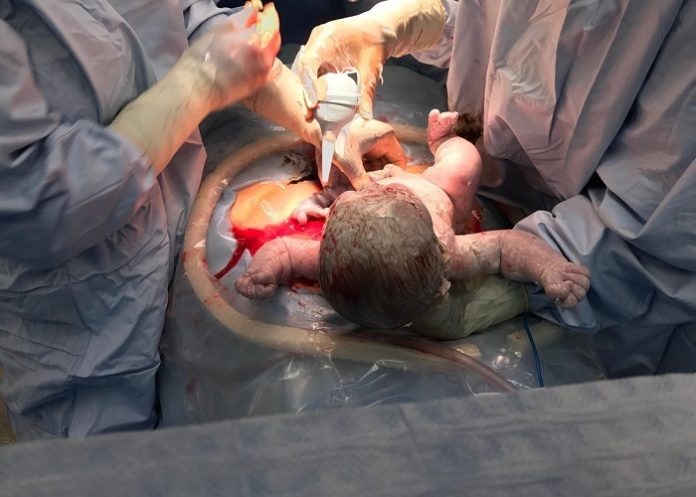Researchers from the Swedish Karolinska Institutet have suggested that children born via planned Caesarean section procedures might have a heightened risk of developing certain childhood cancers, reports The Independent, although the reasons for this are not clear.
After studying the health of nearly 2.5m children, the scientists said they found an increased risk of them developing acute lymphoblastic leukaemia during these events – but not in similar emergency C-section procedures, for reasons they are still working to understand.
“C-sections are an important and often life-saving part of obstetric care,” said researcher and lead author Christina-Evmorfia Kampitsi. “We don’t want mothers to feel anxious about medically indicated C-sections, but when this result is combined with other study results showing the risk of later asthma, allergies or type 1 diabetes increases in children born by planned C-section, there is reason to discuss C-sections that are not medically indicated.”
Kampitsi and her team found that of the nearly 376 000 children born by C-section in Sweden between 1982 and 1989 and 1999 to 2015, nearly 1 500 later developed leukaemia. The risk of acute lymphoblastic leukaemia was 21% higher in children born by planned C-section than in children born vaginally.
Furthermore, the risk of developing the most common form of acute lymphoblastic leukaemia – B-cell acute lymphoblastic leukaemia – was 29% higher in those born by planned C-section. The increased cancer risk was more pronounced in boys than in girls, and in the early years of a child’s life.
Acute lymphoblastic leukaemia is a type of blood and bone marrow cancer, and the most common type of cancer in children.
The researchers emphasised that the risk of developing these cancers remains low, regardless of the mode of delivery.
The excess risk associated with planned C-sections corresponds to approximately one case of B-cell acute lymphoblastic leukaemia annually, they added.
“Fortunately, acute lymphoblastic leukaemia is rare,” said Kampitsi. “This means that many C-deliveries are needed to obtain a statistically significant result, and it is difficult to obtain such a large sample in a Swedish registry study. However, the results are close to significant, are in line with what previous studies have shown, and remain when we adjust for other relevant factors, which still makes them relevant.”
The findings were published in The International Journal of Cancer.
Study details
Mode of delivery and the risk of lymphoblastic leukaemia during childhood—A Swedish population-based cohort study
Christina-Evmorfia Kampitsi, Hanna Mogensen, Mats Heyman, Maria Feychting, Giorgio Tettamanti.
Published in The International Journal of Cancer on 4 July 2025
Abstract
Caesarean section (CS) rates have been increasing beyond medically warranted thresholds, despite potential long-term adverse outcomes. Previous research on CS delivery and childhood leukaemia is conflicting but suggests an increased acute lymphoblastic leukaemia (ALL) risk in children delivered by planned CS. It has been suggested that maternal and pregnancy conditions predisposing to pregnancy complications might confound such an association; therefore, we aimed to elucidate the relationship between delivery mode and ALL in Swedish children. To this end, we studied all children born in Sweden between 1982–1989 and 1999–2014, when comprehensive information on delivery mode was available (n = 2,442,330). Pregnancy conditions, delivery mode, and childhood ALL diagnoses (<20 years) were retrieved from nationwide registers. Cox proportional hazards regression was used to assess the association between delivery mode and childhood ALL, adjusting for maternal and pregnancy conditions. We observed an increased ALL risk among children delivered by planned CS (HR = 1.21, 95% CI 0.96–1.54), driven by B-cell precursor ALL (HR = 1.29, 95% CI 1.01–1.67). The associations were concentrated among boys and at peak ages of ALL incidence (≤5 years) and persisted after accounting for potential confounders, including maternal and perinatal factors. Unplanned CS was not associated with increased risk of childhood ALL. Our nationwide study supports an association between planned CS and an increased B-cell precursor ALL risk in Swedish children, irrespective of maternal and pregnancy conditions. Possible underlying mechanisms, such as lack of exposure to maternal vaginal microbiota or decreased stress hormones at birth, require further exploration.
See more from MedicalBrief archives:
Too posh to push: Time to end damaging anti-Caesarean stigmas
Natural birth obsession is a ‘tragedy’ for many mothers and their babies
SA’s ‘too high’ Caesarean birth rate must be reversed

